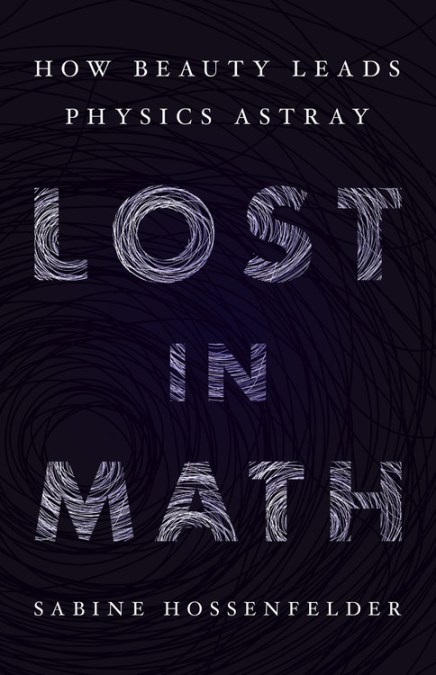
Sabine Hossenfelder, author of Lost in Math: How Beauty Leads Physics Astray, offers some reflections on the price one pays for insisting that we are constantly gaining new knowledge, whether we are or not:
The hype-cycle is self-sustaining: Scientists oversell the promise of their research and get funding. Higher education institutions take their share and deliver press releases to the media. The media, since there’s money to make, produce headlines about breakthrough insights. Politicians are pleased about the impact, talk about international competitiveness, and keep the money flowing.
Trouble is, the supposed breakthroughs rarely lead to tangible progress. Where are our quantum computers? Where are our custom cancer cures? Where are the nano-bots? And why do we still not know what dark matter is made of?
Most scientists are well aware their research floats on
empty promise, but keep their mouths shut. I know this not just from my personal experience. I know this because it has been vividly, yet painfully, documented in a series of anonymous interviews with British and Australian scientists about their experience writing grant proposals. These interviews, conducted by Jennifer Chubb and Richard Watermeyer (published in Studies in Higher Education), made me weep… Sabine Hossenfelder, “Merchants of Hype” at BackRe(Action)
Her link takes us to this pay walled article:
Abstract: A focus on academic performativity and a rationalizing of what academics do according to measurable outputs
has , in the era of higher education’s (HE)neoliberalization and marketization, engendered debate regarding the ‘authenticity’ of academic identity and practice. In such a context, a ‘performative’ prioritization of leveraging ‘positional goods’, such as external research funds, presents a specific challenge to the construction of academics’ identity where in being entrepreneurial they are perceived to compromise traditional Mertonian edicts of scholarship and professional ideals of integrity and ‘virtuousness’. In this article, we consider how academics sacrifice scholarly integrity when selling their research ideas, or more specifically, the non-academic impact of these, to research funders. We review attitudes towards pathway to impact statements – formal components of research funding applications, that specify the prospective socio-economic benefits of proposed research – from (n = 50) academics based in the UK and Australia and how the hyper-competitiveness of the HE market is resulting in impact sensationalism and the corruption of academics as custodians of truth. – Jennifer Chubb & Richard Watermeyer, Artifice or integrity in the marketization of research impact? Investigating the moral economy of (pathways to) impact statements within research funding proposals in the UK and Australia, Journal of Studies in Higher Education, Pages 2360-2372 | Published online: 24 Feb 2016 (paywall – but Update: Preprint here. Thanks to reader Ian Thompson at 1!) More.
In short, the hype we keep hearing in pop science media isn’t just an invention of soon-to-be-jobless hacks; it’s coming from the profs. And it affects discussion of science. Phrases like “billions of habitable planets” or “masses of evidence for” this n’ that roll off the tongue. Proof of string theory and thinking robots are just around the corner. Have been for decades.
Only people who are in trouble for not barking the party line seem to be accountable. And nothing they can say clears them.
Tellingly, Hossenfelder adds, “So here is the puzzle: Why can you not find any expert, besides me, willing to publicly voice criticism on particle physics? Hint: It’s not because there is nothing to criticize. ”
Follow UD News at Twitter!
See also: Sabine Hossenfelder: Physics Problems That Lead To Breakthroughs Arise From Inconsistencies In Data, Not Beautiful Math
Theoretical Physicist Sabine Hossenfelder Shares Her Self-Doubts About Exposing Nonsense In Cosmology
and
Top Ten AI hypes of 2018 by Robert marks. (AI may be among the worst for hype.)